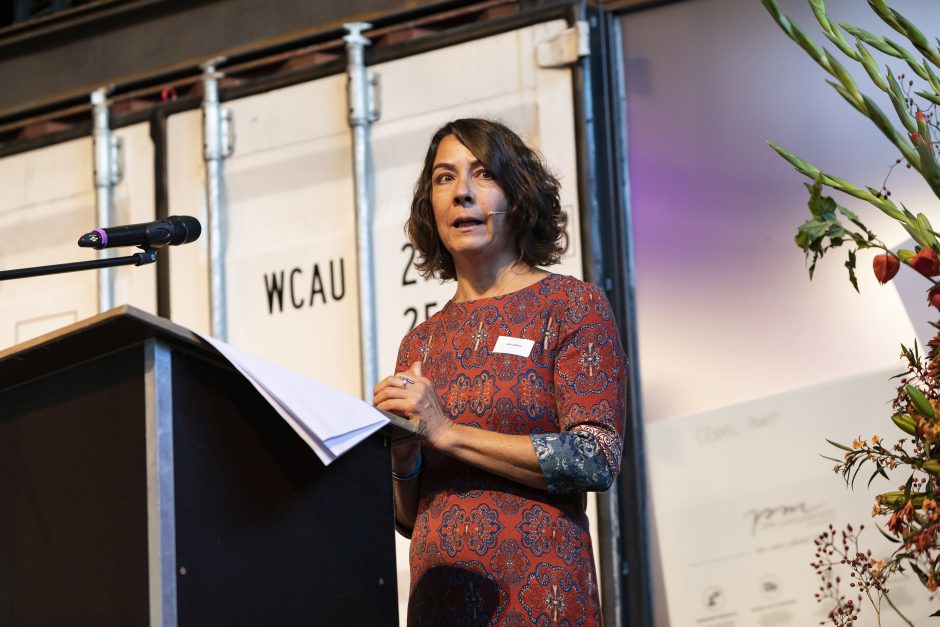Representatives from housing co-operatives from around the world met in Zurich on 22 September to explore ways to foster affordable co-operative housing.
The hybrid in-person and online event was hosted by WBG Zurich, the largest of nine regional associations of Swiss housing co-operatives.
In Zurich alone there are 100 housing co-ops, with a 23% market share of all apartments in the city. Nationally, there are 1,700 limited profit housing organisations in Switzerland, including housing co-ops. Together these organisations account for 10% of the total housing stock in Switzerland.
The co-operative housing movement in Switzerland started more than 100 years ago, in response to acute housing shortages.
Karin Vasella-Kuhn, head of the city of Zurich’s office dealing with nonprofit housing, provided an overview of its activities to support co-ops, starting in 1924 with a set of guidelines to support the sector. This included the sale or long-term lease of land for nonprofit housing development, giving loans, and buying participation certificates or shares. These principles, still in place, made it easier for housing co-ops to get mortgages. In 1943 the city adopted a framework to grant interest free loans or contributions for rent reduction, for the benefit of households with low incomes and assets.
Related: Interview with Blase Lambert on barriers to UK co-op housing
Since then the city of Zurich has approved CHF469m francs though these credits to subsidise rents for low income households.
And in 2011 it set a goal to increase the proportion of not-for-profit rental apartments in the city from a quarter to a third by 2015. This target has been met and the city continues to view co-ops as crucial to affordable housing. Existing mechanisms to support housing co-ops led by the city include interest-free loans to assist with the purchase of land, and free, long-term renewable leases on land the city owns – including development rights.
Stephanie Fürer, scientific associate at the Swiss Federal Office for Housing (UNECE), discussed tge national rolling fund to support the country’s co-ops, with money granted based on the quality of dwellings, disability access and environmental considerations. The fund is administered by co-op umbrella organisations, reuses proceeds from regular amortisations for new loans, and has no cost to the government.
Support is also granted via the Bond Issuing Cooperative for Limited Profit Housing, established in 1991 by the Swiss government and the co-operative housing movement. The co-op purpose raises cheap finance for non-profit housing construction by issuing bonds in the name of the EGW/CCL and distributing these funds among affordable housing providers.
“There’s close monitoring of who gets the money for what projects, so the default rate is close to zero,” said Fürer. “We’re quite confident that it won’t get costly because it’s very closely monitored – it’s something that could be copied by other countries, if there’s political will.”
A key ingredient in the Swiss model’s longevity is the autonomy enjoyed by co-op umbrella organisations: they administrate the process, with the government role limited to loan guarantees and rolling fund assistance. “It means the needs are met well,” said Fürer. “The umbrella organisations know what they need because they are close to the members.

Julie La Palme, secretary general of Co-operative Housing International (CHI), agreed that the Swiss model could be replicated. “We can see the success of co-operative housing in Switzerland, particularly here in Zurich, with housing policy and the financing mechanisms facilitated at regional and national level, and this is a model that is worth emulating in other parts of the world.
Sorcha Edwards, secretary general of Housing Europe, warned that increasing supply alone will not solve the world’s housing crisis. She referred delegates to her organisation’s 2021 report on affordable housing, which looks at strategic land policy, purposeful investment and good governance. The report, she said, is not a blueprint, but a toolbox of different successful policies.

“A co-op approach to housing has to be part of the solution to this massive global crisis,” she said. “But, of course, it doesn’t come on its own – we can’t only rely on people power; the right regulatory structures and financing must be in place to allow those co-operatives to flourish.”
Housing Europe’s research also found that the sector is more likely to promote micro grids and local renewable energy production – but some regulatory constraints prevent co-ops from using the local grid to share the energy they produce between different buildings.
Related: Canadian government to embark on $500m co-op house-building spree
Legislation can also be a barrier. In East Europe, the housing stock is primarily in individual ownership and there is a lack of regulatory frameworks and institutions suitable for housing co-ops.
Recognising that they faced common challenges, co-operators from Croatia, Czech Republic, Hungary, Serbia and Slovenia set up the housing co-op network Moba Housing SCE in 2017.

“Financial actors are not willing to take risks,” said Moba’s Zsuzsi Pósfai. “They’re not willing to support pioneers and experimental actors, and since the sector doesn’t exist, we only have pioneers and experimental actors.”
Moba set up its own Housing Development Fund in 2021 with seed capital of €21,600 from ABZ housing co-oeprative in Zurich.
“It looks like we will be able to add some additional seed funding from another grant into this accelerator,’ added Pósfai. “And from this MOBA can give short-term loans to its members.”
Moba is looking for support from other co-ops, who can either donate or to buy withdrawable shares.

Members applying for loans must pitch their project to Moba which asses its viability; it charges affordable interest to cover the operational costs.
In Barcelona, Sostre Civic co-operative runs multiple housing projects across Catalonia, with the most recent start-up, Cirerers, coming in 2016. The city of Barcelona granted Sostre land to build housing units in Roquetas, a neighbourhood close to mountains. Construction began in 2020 and by April 2022 residents had moved in.
“It is important to have Sostra Civic because they provide the tools that groups can then use and take decisions in their own projects,” said co-op resident Esther Alegre.
Ander Zabala Gómez, administrative assistant of Sostre Civic, highlighted the importance of having an ethical bank to get housing co-ops off the ground. “The solidarity economy network makes it possible for these ethical banks to exist,” he said. “You need a whole ecosystem that supports each other. Traditional banks do not trust housing co-ops.”
The city’s support through the lease of the land was also crucial to the project’s success, he added.

Some co-ops also support other co-ops abroad. Switzerland’s largest housing co-op, Allgemeine Baugenossenschaft Zürich (ABZ), runs a solidarity fund which has supported 45 projects worldwide with CHF1.35m over the past three years.
The symposium also touched on the idea of having wealthier members pay more to subsidise the rent of members on lower income. Blase Lambert, board member of CHI and CEO of the UK’s Confederation of Co-operative Housing, said co-ops differ on how they interpret the principle of equality.
“There are definitely opportunities, with varying price models, for people on higher incomes to be supporting people on lower or even no incomes,” he said. “But there are some in the co-op housing world who think that’s a complete anathema to what the model should be about – which be everyone paying the same.”